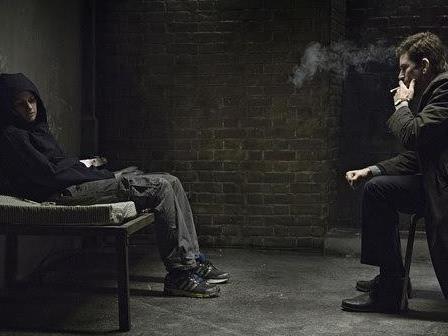A detective with a reputation for being difficult, a mismatched partner, and a twenty-year-old crime no one else cares about: welcome to the latest page-to-screen adaptation of the Department Q novels. With the series template already set by The Keeper of Lost Causes, the returning cast and crew neither need nor dare to deviate from the successful formula. And while The Absent One (Fasandræberne) may have its path preordained in giving a second serving of filmic flesh to Jussi Adler-Olsen’s books, it recognises that adhering to type can be engaging if saddled with a commitment to making a stylish feature in its own right, as well as an engrossing plot.
Carl Mørck (Nikolaj Lie Kaas, TV’s The Killing) and his colleague Assad (Fares Fares, Zero Dark Thirty) have certainly settled into a routine, sorting through cases thought unsolvable from the basement of Copenhagen’s police headquarters. Alas, the fanfare of their first triumph has faded; however the suicide of an ex-cop may change their fortunes. The dead man had been trying to solve the murders of his twin teenage children two decades earlier, their killings attributed to a culprit, but unexplained details throwing the matter into doubt in his mind. Mørck swiftly agrees that something else is afoot, delving into circumstances involving a boarding school, a homeless woman (Danica Curcic, The Bridge), and two of Denmark’s top executives (Lucy‘s Pilou Asbæk and Serena‘s David Dencik).
As in its predecessor, the story of then and now unravels simultaneously, flashbacks filling in the gaps whenever Mørck and Assad reach certain points in their search. Though such an approach robbed The Keeper of Lost Causes of its tension, here a new tale – plus thematically richer material and the decision to reveal fewer major twists and turns – makes all the difference. That the contemporary timeline need not linger on establishing the leads or their relationship also helps, leaving ample room to intercut the central investigation with the activities of key figures in the case. Indeed, though working within established bounds, series screenwriter Nikolaj Arcel and newcomer co-scribe Rasmus Heisterberg (previous collaborators on A Royal Affair and the Swedish version of The Girl with the Dragon Tattoo) stumble upon the best use of their prescribed formula.
The same can be said of director Mikkel Nørgaard (Klown), who crafts his feature as much as another instalment in the episodic saga – with third effort A Conspiracy of Faith due out in 2016, albeit with a fresh helmer – as a well-paced and -shot standalone procedural. Under his guidance, cinematographer Eric Kress (Taken 3) both saturates the screen in the expected blues and greys of a Scandinavian noir that deals in darkness and violence, and lets warmth brighten up the images glimpsed in the 1994-set backstory. Similarly, editors Morten Egholm (Father of Four) and Frederik Strunk (On the Edge) equally understand the importance of giving each sliver of narrative time to breathe while compiling a tight, terse overall package.
It may appear that less is asked from Kaas and Fares, given that their protagonists are already known commodities, but the two aren’t just a likeable odd couple. Indeed, like the film they inhabit and their off-screen colleagues, they impart nuance that does more than just go the genre motions. In their hands, a no-nonsense cop can become a symbol of empathy through the revelation of depth in just a few scenes, while a seemingly incompatible offsider can exceed such a role – and even win Denmark’s equivalent of an Oscar for his efforts. The remainder of the cast, including the recognisable Asbæk and Dencik, plus Johanne Louise Schmidt (Hjælp, det er jul) as a new recurring character, help enliven the moody mystery that proves typical in the best way possible.
Rating: 3.5 stars out of 5
The Absent One (Fasandræberne)
Director: Mikkel Nørgaard
Denmark, 2014, 119 mins
Scandinavian Film Festival
http://www.scandinavianfilmfestival.com/
Sydney: 8 – 26 July
Melbourne: 9 – 26 July
Canberra: 14 – 26 July
Brisbane: 16 – 26 July
Byron Bay: 17 – 23 July
Adelaide: 22 – 29 July
Perth:23 – 29 July
Hobart: 23 – 29 July
Actors:
Director:
Format:
Country:
Release:





